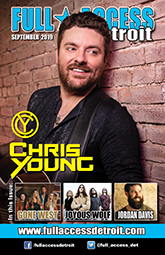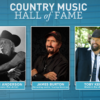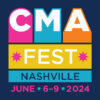
“I didn’t write this album for radio. I knew that for me to make this record without that pressure. I think that freed me up a little bit,” stated Tracy Lawrence.
It’s early in the week, early in the day and the twang in Tracy Lawrence’s voice is a welcomed reprieve from robocalls and the squawking coming from cable news. Something about the timber in his voice is genuinely melodic. On the other hand, the pace and the rhythm feels more like it’s half-time and the pep squad is instilling a confidence never quite seen before.
His southern drawl and infectious enthusiasm never subsides. Lawrence’s mesmerizing recollection of recording his new album, Made In America, is a fascinating look at an artist that has done what so many have dared to dream, whereas only a few actually attain. The Grammy nominee has charted 18 No. 1 songs and sold more than 13 million albums. He’s the guy that watched songwriting from the sidelines and jumped into the fray as
a co-writer on massive hits like “Stars Over Texas” and “Can’t Break It To My Heart.”
He’s also the guy that admits that he’s lacked the confidence to truly put his own storytelling and songwriting skills to the test. “Life” he said is the reason it took so long for him to get to this point. It’s the only pause in the conversation; it’s just a slight breath leading up to the word. In that short sigh he sums up the years of honky tonk appearances and nearly 50 charted singles.
For the first time in the country singer’s more than 25 years in the business, the Foreman, Ark.-raised icon wrote the majority of the album’s songs. Of the 12 tracks, Lawrence co-penned eight. The experience, drawn out as it became, saw Lawrence going back to his publisher’s tune store several times before finding the right songs that make up what he describes as “the small things people around our nation do.”
“I had gone out early on to cut some Christmas songs – this was about three years ago, so July of 2017 when I started making this record, so when I went in and cut a couple new songs for my Christmas record, there were two songs that were initially cut,” Lawrence said. “The first two were the first to this record, they were ‘First Step To Leaving’ and “It Ain’t You.’”
Lawrence continued that he even went and asked longtime friend and writer Paul Nelson to come out of retirement to work on some material. Nelson, who worked with Lawrence on such mega hits like “How A Cowgirl Says Goodbye” (1997), “As Any Fool Can See” (1994), “I See It Now” (1994) “My Second Home” (1993) and of course, “Stars Over Texas” (1996), joined Lawrence on “It Aint You” and the title track.
The 51-year-old knew what he wanted out of the record and fought to find the songs that measured up to his expectations. He was mentally ready for the challenge of writing and came prepared with melodies and song structure.
“I knew that I wanted this record to be traditional,” he said. “I knew that I
wanted to cut an album that is different from anything that I’ve cut in the past. I didn’t want ‘Sticks and Stones’ and ‘Alibis’ kind of songs. As we kind of filtered through, I continued to look for stuff and didn’t find a lof stuff that really blew me away. As we got towards the end, I went back to Rick Huckabee, with my publishing company, and went back four or five years, which is where I found Just The South Coming Out’, ‘Stay Back A Hundred Feet’, ‘Chicken Wire’.”
Those songs are the last three songs on Made In America and Lawrence felt like it had a more rock flavor marinating. The flow then turned into a more traditional tone, with “When The Cowboy’s Gone” (Lawrence co-wrote with Carson Chamberlain and Wyatt McCubbin) and the album really started to take shape.
“Toward the last two or three months before I was scheduled to have it turned-in I was working with ‘Chicken Wire’ as the working title of the album,” Lawrence said. “I had this whole roadhouse vision in my head with the band behind chicken wire, getting beer bottles, the broken glass and the beer splashing on us, and one of the last pieces that was written was ‘Made In America.’ I had never done an Americana song.
“I wanted to be positive and uplifting. I didn’t want it to have political overtones to it. I wanted it to be about the America I remember when I was a kid. I want it to be about pride in your school mascot and what your dad does for a living.
We started throwing out ideas and when we finished that song in about two-and-a-half hours, I realized the whole album had just come into focus. That was the pivotal point that I knew that it was done. It took a long time – I’ve never done a record that took me that long to figure what it was about. I just kept writing and it just came together.”
Lawrence is quick to recognize Nashville’s songwriting community and his appreciation for the craft. “I’ve been blessed over the years of recording music and making these projects and to really be exposed to true American poets. Guys that are really exceptional at what they do. I have so much respect for the songwriters in this town. There are guys that do this every day for a living, that punch the clock with songwriting and come in with ideas. I’ve learned from them so much over the years. I really knew what I was doing this time.”
Made In America doesn’t have a song zspecifically about Thanksgiving, but Lawrence’s story wouldn’t be complete without a mention of his annual event, MISSION: POSSIBLE Turkey Fry and Concert. This 501 (C) (3) organization has raised more than half a million dollars for the homeless and hungry in Dallas, Louisville, Nashville and has served more than 84,000 meals in its 14 years.
Like most American success stories, it started out small. “It started out with just us wanting to help out the mission, and from there it grew,” he said. His organization has developed a whole system and template for other cities to follow for their own events.
“We’re trying to grow this to a national campaign….it takes a lot of volunteers. The initial mission of this whole thing was to try and change the public perception of what homelessness is about and it’s really tough sell right now when you go out to L.A. and some places. It’s bad,” Lawrence said. “I think Nashville has a better grasp on it than most other cities I’ve been to, because the focus is on much, if not more, on rehabilitation and getting people re-acclimated and be constructive members of society. It’s not only about giving somebody a bed when it’s cold, giving somebody a meal when they’re hungry. There’s so much more that goes into it. Getting peoples’ lives back on, that’s really what this all about.”
Lawrence notes love and music as the driving forces that kept him going.
“I came here with nothing and didn’t know anybody, and by the grace of God I didn’t wind up (homeless),” he said. “A lot of things happen in life that are beyond your control.”
















